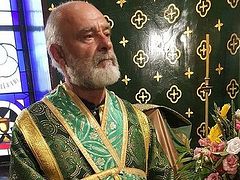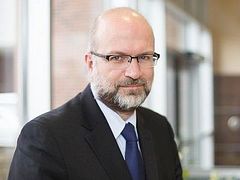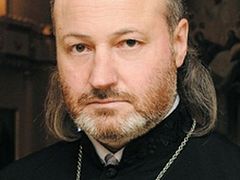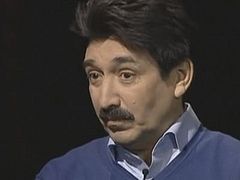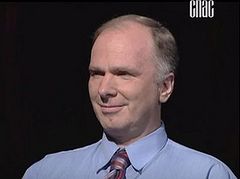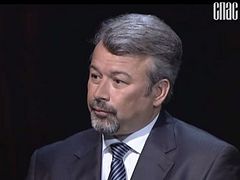Once Bishop of Vorkuta and Usinsk, he is now serving as Bishop of Domodedovo, a Patriarchal vicariate. At the beginning of this year, Vladyka John (Rudenko) was transferred to Moscow and made head of the North-Eastern Vicariate of the Russian capital, as well as head priest of the Church of the Life-Giving Trinity in Sviblovo (a Patriarchal podvoriye).
The journey Bishop John made to his current role was not a simple one. Before Vorkuta he served in the Ivanovo Region for a long time, but was actually born in Novosibirsk, where he defended his dissertation in radiophysics, worked as a researcher, and taught. That is, before he suddenly changed his life.
Science didn’t interfere with faith
—You were nearly thirty years old when you were baptized. What was your motivation?
—In the beginning, I was interested in Christianity in general. After the fall of the Soviet Union, all sorts of foreign preachers began coming to Novosibirsk and showing films about the Gospel. I was studying for my doctorate then while also running a small business. In the mid-90s, I was invited to America for an internship, to a rural state, and this trip made a big impression.
—Was it there that you became familiar with Orthodoxy?
—No, I was still quite far from participating in church life. But I was surprised by the role religious faith played in American heartland. I saw how people—with all sorts of dogmatic errors, mind you—were actively living as Christians, supporting each other, helping their neighbors, acting as the Gospel tells us to. This was a contrast with Novosibirsk, which at the time resembled a spiritual desert. When I was filling out the forms to get my visa, there was a space to write your religion, and I wrote “Orthodox” though I had not yet been baptized. Once I returned to the Motherland, I decided that it was time to really become Orthodox.
—Did your scientific work contribute to this decision, or did it present problems?
—Science does not interfere with faith. On the contrary, my teachers and older colleagues always taught us to think more broadly, not to get stuck on narrow questions. When I told them I wanted to study not just physics, but also metaphysics, they supported me. In fact, faith helps a scientist. We expand the limits of our knowledge thanks to our Creator. I am deeply convinced that when a person genuinely seeks the truth, he is moving toward God. And if he isn’t moving toward God, then the question arises of what he is really seeking: the truth, or maybe some kind of lifestyle that’s more convenient for him.
“How could you hide your mother from us?”
—Why did you choose monasticism?
—In the mid-90s, monks from the Trinity-Sergius Lavra came to Novosibirsk. I carefully observed and listened to them, and it was a special, personal impression. A completely new life opened up for me. I had, of course, read about monasticism before then, but to see and hear it myself was a completely different thing. The holy apostle Paul called this “faith [that] cometh by hearing.” I felt a strong pull toward monasticism.
—How did your parents react to your decision?
—They worried, of course, especially when I received a blessing to leave Novosibirsk and go to Nikolo-Shartomsk monastery in the Ivanovo Region (more than 2,500 km/2,500 miles away). In the beginning, I too had hoped that I would stay in my hometown, continue teaching in the university, and have an influence on the students there. But the elder said that it would be better to follow Abraham’s example, set off for an “unknown land,” and fully trust in the Lord.
—So you left your parents?
—Yes, but my mother was willing to share a difficult period with me—a new life in a new place. She would take a holiday, come to the monastery, and help out as a volunteer at the monastery. She wanted to be closer to me, to make sure that I hadn’t made a mistake, and understand my decision. There were many good priests who comforted and strengthened her. When Elder Naum saw her for the first time, he told me, “What a good mother you have! How could you hide her from us all this time?” She was obedient, meek, and didn't question what the elder said.
We no longer need to look for elders
—Having served in the Ivanovo Region for many years and managed the Vorkuta Eparchy, you were transferred to Moscow. What is your impression?
—I can say that the clergy in Moscow have inspired me. You know, fifteen years ago provincial priests used to say about the priests in Moscow, “Some of them serve God, and others serve their own interests.” And one reason for this idea was all the Muscovites who went to the countryside searching for true spirituality and supposed elders, often phonies. These Muscovites spoke about life in Moscow as hectic and far from the Christian ideal. Now I am convinced the clergy in Moscow are offering a correct and edifying example for all of the Russian Church.
—The capital offers many possibilities for cultural life. Are you able to keep up with what is new in the art world or return to the classics?
—Our main treasure is time, and there isn’t enough of it. There is always a chance to come into contact with art that benefits the soul—sometimes in unexpected places. Even with Russian pop songs, you can hear a lot if you listen through the lens of the Gospel. When I visit different parishes, I talk to the priests, and some of the deacons sing typical pop songs that many parishioners hold dear. Take the song, “Ray of the Golden Sun”, from “The Bremen Town Musicians” [a popular animated film from the Soviet era based on the tale by the Brothers Grimm]—it corresponds to the Song of Songs in the Bible. Or the famous song from the film “Seventeen Moments of Spring” [a famous Soviet television series about a Russian spy in Nazi Germany] that is likewise full of Christian meaning. Don’t forget the song, “It wasn’t us who invented the world”, or, “Tell me, birds”—there’s so much light in these songs!
—A common question is what people seek and find in monasticism.
—First of all, you have to understand, that people should not go to a monastery to escape difficult life situations, find a “quiet harbor,” and live quietly without any cares. A man becomes a monk with one goal: to work for God. When you make this choice, you acknowledge that the Lord is your only master, and you are His servant. If a person is attuned to this, he is guaranteed success no matter what happens in the future. At the beginning of my monastic life, one monk I know observed, “Despite any weaknesses and afflictions, monks are the happiest people.” It seems like a paradox, but it is true.
—So you are a happy person?
—Absolutely.


